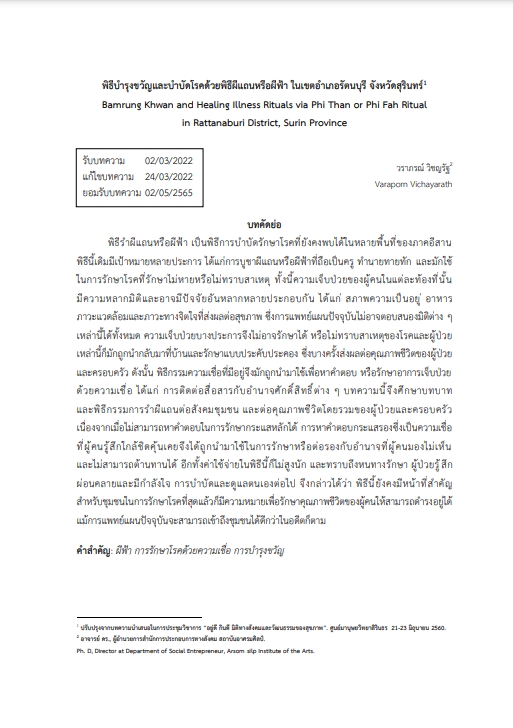Bamrung Khwan or Healing Rituals Approached via Phi Than or Phi Fah Ritual in Rattanaburi District Surin Province
Keywords:
Phi Pha, Blief in healing, Encouraging ritualAbstract
Ram Phi Than or Ram Phi Fah ritual is a healing ritualfound in several areas in Northeastern of Thailand. Originally, thisritual once held manypurposes–to pay homage to the master Phi Than or Phi Fah, to foretell the village’s future events, and to heal the incurable or idiopathic deceases. However, the illnesses occurred to people come from different areas andvarious dimensions together with various factor involvement including living conditions, provisions, surroundings and mental state. All of them influence their health Modern medicine could not cover all of the patients’ etiology. This leads to some incurable or idiopathic deceases.These patients are thus taken home for palliative care. Sometimes, this problem affects, on the patients' and family's way of asa result, the existing spiritual rituals are employed to reply the inquiries or cure the illnesses by using spiritual beliefs such as communication with, various holy power.Hence, Ram Phi Than ritual has an important role toward the society in healing their mind, affecting the overall way of life of patients and their family. Due to not finding out the answer for curing the patients in medical treatment, finding the answer in indirect way as a spiritual ritual in which locals believe is employed to heal the illnesses and fight the invisible and irresistible spirits. Furthermore, the expenses for this ritual are inexpensive and the patients can know how to treat them. They then feel reared, have moral support to heal their illnesses and take care of themselves.Therefore, it is believed that Phi Than or Phi Fah ritual plays an important ritual for of local people in Northeastern of Thailand. Finally, this ritual is meaningful tomain the quality of life of locals except the progress of modern.
Through Ram Phi Than ritual, they searched for unseen and irresistible powers that are claimed to be the causes of the deceases, for example, illnesses directly come from the power of a spirit or the unintentional but disrespect actions such as cutting down the spirit-living tree. After the Ram Phi Than ritual is performed, the patients and their family believe that they finally found the answer and how to cure the decease. When they follow the instructions given by the representative of Phi Than, the incurable decease is believed to be recovered. Moreover, the cost of operation is acceptable.
In overall, Phi Than or Phi Fah ritual plays an important role as a healing ceremony in the communities in Northeastern Thailand. Despite the modern medicine, which could nowadays better reach the locals, the ritual contributes to maintain the well quality of life of the people
References
กฤตยา แสวงเจริญ. (2527). หมอลำผีฟ้า ผู้รักษาพื้นบ้าน. วิทยานิพนธ์วิทยาศาสตรมหาบัณฑิต สาขาจิตวิทยาคลินิก บัณฑิตวิทยาลัย มหาวิทยาลัยมหิดล
จิรภัทร บุตรจันทร์. (2560). สัมภาษณ์. 29 เมษายน.
ฐพัชร์ โคตะ. (2553). การรำผีฟ้าของชาวส่วย บ้านศาลากัลป์พฤกษ์ ตำบลปราสาท อำเภอห้วยทับทัน จังหวัดศรีสะเกษ อัตลักษณ์ พิธีกรรมและความเชื่อ. กรุงเทพฯ: สำนักบัณฑิตอาสาสมัคร มหาวิทยาลัยธรรมศาสตร์.
ทองแดง แนวทอง, ผู้ดำเนินรายการวิทยุชุมชนน้ำเขียวเรดิโอ และเกษตรกรผู้ปลูกสมุนไพร. (2560). สัมภาษณ์. 28 เมษายน.
ธรรมา ชัยทอง. (2560). สัมภาษณ์. 29 เมษายน.
นิรันดร์ ละม้ายศรี. (2533). การรักษาโรคภัยไข้เจ็บโดยการเหยาของชาวไทยโส้. กรุงเทพฯ: สำนักบัณฑิตอาสาสมัคร มหาวิทยาลัยธรรมศาสตร์.
นิออน จิตสุภาพ. (2560). สัมภาษณ์. 30 มีนาคม.
บุญยงค์ เกศเทศ. (2537). “ผีฟ้า พญาแถน” ชีวิตไทย ชุดบูชาพญาแถน. กรุงเทพฯ: สำนักงานคณะกรรมการวัฒนธรรมแห่งชาติ กระทรวงศึกษาธิการ.
เพ็ญจันทร์ ประดับนุช. (2534). สังคมวัฒนธรรมของการใช้สมุนไพร. นครปฐม: ศูนย์ศึกษานโยบายสาธารณสุข มหาวิทยาลัยมหิดล.
วิบูลย์ สำเภาเงิน. (2560). สัมภาษณ์. 30 มีนาคม.
สีลับโกษา. (2560). สัมภาษณ์. 29 เมษายน.
เสรี พงศ์พิศ. (2533). ไสยศาสตร์ในสังคมไทย. นนทบุรี: สำนักพิมพ์มหาวิทยาลัยสุโขทัยธรรมาธิราช.
Kleinman, A. (1985, May). Interpreting illness experience and clinical meaning: How I see clinically applies anthropology. Medical Authropology Quarterly, 16 (3), 69-71.
Phillips, D. R. (1990). Health and health care in the Third World. New York: John Wiley & Son.

Downloads
Published
How to Cite
Issue
Section
License
Copyright (c) 2022 Journal of Humanities and Social Sciences Nakhon Pathom Rajabhat University

This work is licensed under a Creative Commons Attribution-NonCommercial-NoDerivatives 4.0 International License.
Journal of Humanities and Social Sciences Nakhon Pathom Rajabhat University





